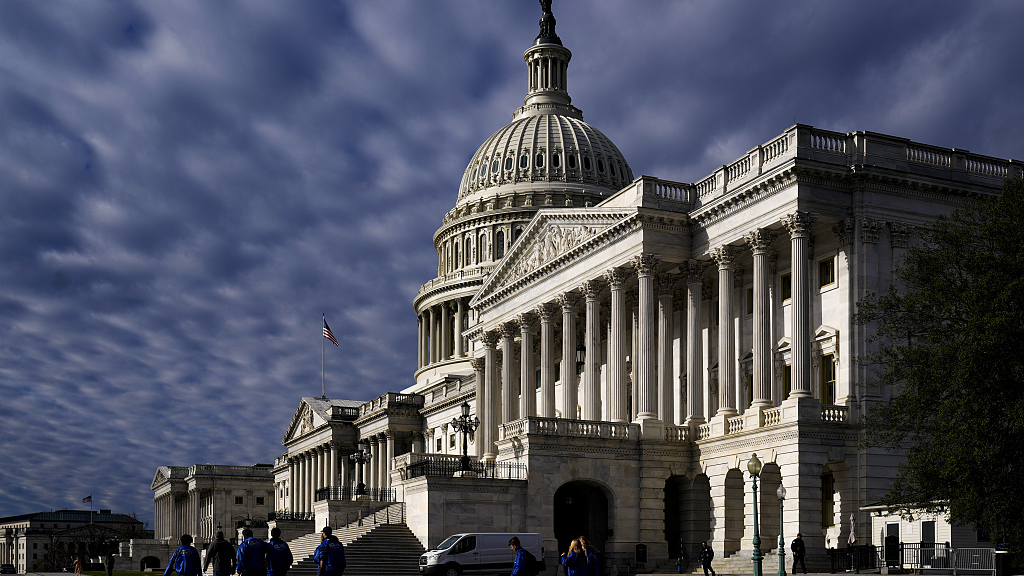
The U.S. Capitol in Washington, D.C., U.S., April 1, 2022. /VCG
The U.S. Capitol in Washington, D.C., U.S., April 1, 2022. /VCG
Editor's note: Bradley Blankenship is a Prague-based American journalist, political analyst and freelance reporter. The article reflects the author's opinions and not necessarily the views of CGTN.
One of the most perplexing things about the U.S.-led sanctions on Russia over Moscow's "special military operation" in Ukraine is the fact that they will hurt people in the countries imposing them. That's because Russia is an important economic partner for the world in extremely important sectors, like energy and agriculture. With these countries already facing myriad inflationary pressures, sanctions on Russia would only make this problem worse.
The U.S. has taken a noteworthy approach to this issue: Ignoring its own sanctions. On March 8, President Joe Biden issued an Executive Order to ban Russian oil, liquefied natural gas and coal. A fact sheet published by the White House suggests that this is a complete ban, meaning that it should totally cut off Russian fossil fuels supplies to the U.S.
As is ever the case, this is not how it has panned out in reality. Russian Security Council Deputy Secretary Mikhail Popov stated on April 3 during an interview with Russian daily newspaper Komsomolskaya Pravda that the U.S. had increased its oil imports from Russia by 43 percent to 100,000 barrels per day over the past week. He also noted that the U.S. granted exceptions for mineral fertilizer from Russia.
What's ironic about this, according to Popov, is that U.S. allies are effectively barred from taking similar actions to stave off the inflationary effects of these sanctions. Washington had suggested that it would bravely make sacrifices to "stand with Ukraine" and has threatened some allies with sanctions over continuing business with Russia.
Clearly, the Biden administration, with the Democratic party facing critical midterm elections this year, sees its own interests as more important than its allies', which reduces the latter to sidecars to America's imperial project rather than an autonomous geopolitical player.
According to the Economic Intelligence Unit, the conflict in Ukraine has cost European countries like France, Italy and Germany the most in terms of projected economic growth. Germany's revised GDP growth for 2022 fell to 2.5 percent from just under 3.5 percent due to the Ukraine war, with Italy's decreasing by about a full percentage point and France's by about three-quarters of a percentage point.

A gas station attendant changes fuel prices on a board at a gas station in Milan, Italy, March 10, 2022. /VCG
A gas station attendant changes fuel prices on a board at a gas station in Milan, Italy, March 10, 2022. /VCG
Likewise, the conflict and the following sanctions have exacerbated inflationary pressures. For example, the German Retail Association announced food retailer price hikes of 20-50 percent that would go into effect on April 4, presumably because of pressures from the conflict.
Europeans are expected to absorb these soaring costs and knock-on effects on economic growth out of moral considerations for Ukraine while Americans are being mostly spared from these same things because of political considerations.
Likewise, the U.S. has threatened to hit India with sanctions and warned that there would be "consequences" for countries that attempt to "circumvent or backfill" the sanctions on Moscow. There is also reasonable suspicion to believe the U.S. has a hand in the ongoing political turmoil in Pakistan, aimed at ousting Prime Minister Imran Khan over his country's dealings with Russia.
At the same time, this seems to be all for naught considering that Russia's ruble has recovered its pre-war value and that the country's economy, in general, seems to be resilient enough to withstand Western sanctions. It raises questions about the conflict's cost on Russia, which Western media has said repeatedly could collapse the Russian economy. This doesn't appear to be the case.
Particularly for Europeans, protracted sanctions on Russia will only lead to more hardship and suffering. Russia forms part of Europe, both economically and politically, and cannot be cut off from the continent without serious damage dealt all around. A Europe that does not include Russia is illogical and foolhardy, which is why the European Union should not be taking marching orders from a plainly self-interested actor across the Atlantic.
The fact that the U.S. is violating its own sanctions by apparently increasing imports of Russian oil and fertilizer to ameliorate citizens' frustrations before an election shows a remarkable lack of commitment to America's own professed values. European leaders should recognize this and understand that the effects of these sanctions on their own citizens will undoubtedly be worse than in the U.S.
(If you want to contribute and have specific expertise, please contact us at opinions@cgtn.com. Follow @thouse_opinions on Twitter to discover the latest commentaries on CGTN Opinion Section.)

